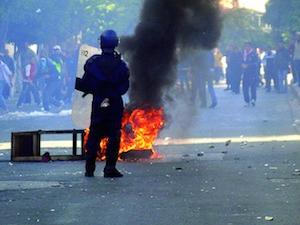Population, food prices and global security
Photo of a protest in Algeria (Image by Flickr user magharebia (cc:by))
This story was originally covered by PRI’s Living on Earth. For more, listen to the audio above.
The term “global security” often evokes images of guns and nuclear weapons. “We have inherited a definition of security from the last century, which was dominated by two World Wars and the Cold War,” Lester Brown, author and president of the Earth Policy Institute told PRI’s Here and Now. “What we’re now faced with is a need to re-define security.”
The biggest threats to our future aren’t coming from invading nations, according to Brown. “It is climate change. It is population growth. It is falling water tables. It is rising food prices. It is failing states.”
Rapidly rising food prices and global political insecurity in places like Libya, Egypt and Tunisia are laying bare the challenges of global security. Brown isn’t willing to say that rising food prices caused the political upheaval in the Middle East, “But there’s no question that, of all economic indicators, I think the most politically sensitive is food prices.”
In the past, with when ecological disasters hit, people could wait out the problem. After a monsoon failure in India or drought in the former Soviet Union, people knew that if we could get through the next year that things would go back to normal. But, according to Brown, “there’s no norm to go back to now. The world’s climate is in a constant state of flux.”
Now, the world faces real, long-term dangers from climate change and rising food prices, according to Brown. For every “one degree Celsius rise in temperature – that’s 1.8 degrees Fahrenheit,” Brown estimates that “we can expect a ten percent decline in grain yields.” Even in aggressive climate targets, where world governments come together and keep the climate from warming more than two degrees, that’s a 20 percent cut in productivity for food on the planet.
For a stable future, Brown says, “we not only need to re-define security in a conceptual sense, but also in a fiscal sense.” He estimates that it will cost about $2 billion per year “to eradicate poverty, stabilize population, restore forests and soils, and all these things.” That’s quite a bit of money, but it may be a small price to pay. Brown says:
“The question is, can civilization as we know it survive these mounting stressors if we don’t get some of the trends generating the stressors turned around.”
———————————————————————————————
Hosted by Steve Curwood, “Living on Earth” is an award-winning environmental news program that delves into the leading issues affecting the world we inhabit. More about “Living on Earth.”
